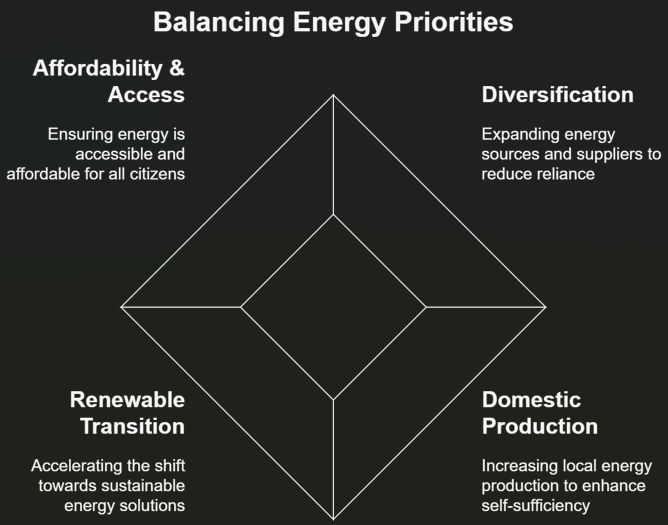India’s Energy Sector Transformation: A Powerful Leap Toward Self-Reliance and Sustainability
India’s Energy Sector Transformation: Empowering a New Era of Sovereignty and Sustainability
Context: Recently, India surpassed Japan to become the world’s fourth-largest economy, with its GDP more than doubling to $4.3 trillion since 2014. India is now not just the fastest-growing major economy (Q4 2024-25 growth rate of 6.7%), but also a strategic energy player, with the energy sector undergoing a structural transformation in the first year of Modi 3.0.

India’s Global Energy Profile: A Strategic Force in the Making
- Position in the Global Energy Landscape
-
- 3rd-largest energy and oil consumer
- 4th-largest oil refiner
- 4th-largest LNG importer
- Projected to contribute 25% of the world’s incremental energy demand by 2047
- Growth Outlook
-
- India’s energy demand expected to grow 2.5 times by 2047
- Current growth rate of 6.7% places India on a path unmatched by peers
Upstream Sector Reforms: Unlocking Domestic Hydrocarbon Potential
- Policy and Exploration Expansion
- Pricing and Contract Reforms
-
- New gas pricing formula: pegged to 10% of the Indian crude basket
- 20% pricing premium for new gas wells
- Revenue-sharing contracts: allow shared infrastructure among E&P players
- Legislative Reforms for Competitive Upstream Sector
- Oilfields (Regulation and Development) Amendment Act, 2024
- Hybrid leases: allow renewable energy and hydrocarbons in tandem
- Discovered Small Fields (DSF):
- Simplified contracts
- Low compliance burden, enabling marginal field development
Recommendations for India’s Energy Sector Transformations
- Enhancing Exploration Confidence through Technology
- Technological Interventions
-
- National Seismic Programme
- Mission Anveshan
- Airborne Gravity Gradiometry (AGG) surveys
- Continental Shelf Mapping in frontier basins: Andamans, Mahanadi, and Cauvery
- Notable Discoveries
- Global Collaborations and Data-Driven Investments
-
- ONGC-bp partnership to boost Mumbai High output: 44% increase in oil, 89% in gas
- Exploration data centre at University of Houston enables foreign investor access to India’s datasets
- Strengthening Downstream Infrastructure: Building a Nationwide Fuel Network
- Infrastructure Growth
-
- 24,000 km of product pipelines
- 96,000+ retail fuel outlets
- Over 67 million consumers served daily
- Strategic Reserves and LPG Access
- Biofuels: Cornerstone of India’s Green Strategy
- Ethanol Blending Milestones
-
- Blending level: from 1.5% in 2013 to 19.7% in 2025
- Volumes: 38 crore litres → 484 crore litres
- Benefits:
- ₹1.26 lakh crore forex saved
- 643 lakh MT emissions reduced
- ₹1.79 lakh crore to distillers, ₹1 lakh crore to farmers
- Feedstock and Ethanol Economy
-
- Diverse feedstocks: molasses, maize, grains
- Creation of a self-reliant ethanol ecosystem
- SATAT and Biogas Initiatives: Toward a Circular Energy Economy
- Over 100 compressed biogas (CBG) plants operational
- Target: 5% blending by 2028
- Central support for:
- Biomass procurement
- CBG–pipeline connectivity
- Green Hydrogen Mission: Fuel of the Future
- 8.62 lakh tonnes of green hydrogen production underway
- 3,000 MW electrolyser tenders floated
- Key Projects:
- IOCL–L&T 10 KTPA project at Panipat
- Green hydrogen investments by BPCL, HPCL, GAIL
- NRL Assam to host northeast India’s first green hydrogen unit
- Digital Governance: PM Gati Shakti Integration
-
- Over 1 lakh oil and gas assets digitally mapped
- Integration with National Master Plan for real-time monitoring
- Key Projects:
- Indo-Nepal Pipeline
-
- Samruddhi Corridor → savings of ₹169 crore through route optimisation
- Natural Gas as a Transition Fuel
- Pipeline and Production Growth
-
- 25,000 km pipeline network; target 33,000 km by 2030
- Gas production:
-
- 2020–21: 28.7 BCM
- 2023–24: 36.4 BCM
- Supply and Pricing Stability
- ‘No Cut’ status for transport and domestic sectors
- Strategic pricing reforms to ensure gas affordability
- Consumer Affordability and Welfare-Focused Fuel Policy
- Despite 58% global rise in LPG prices, PM Ujjwala Yojana (PMUY) beneficiaries pay only ₹553
- Government ensures price stability through:
- Targeted subsidies
- Excise duty cuts
- Compensation to OMCs (Oil Marketing Companies)
Conclusion: In 11 years, India has transformed from energy anxiety to energy confidence
The sector now reflects strategic foresight, self-reliance, and global competitiveness Energy is no longer seen merely as a commodity, but as a strategic tool for sovereignty, security, and sustainable development.
Subscribe to our Youtube Channel for more Valuable Content – TheStudyias
Download the App to Subscribe to our Courses – Thestudyias
The Source’s Authority and Ownership of the Article is Claimed By THE STUDY IAS BY MANIKANT SINGH





